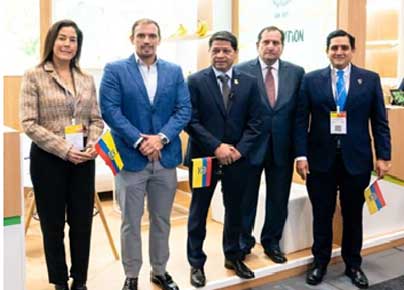Ecuadorian banana growers ask for a fair price for fruit in Berlin
2024-02-16

The Ecuadorian Banana Cluster, represented by AEBE and Acorbanec, together with the support and accompaniment of the Minister of Agriculture, Mr. Franklin Danilo Palacios, and H.E. Diego Morejón-Pazmiño, Ambassador of Ecuador to Germany, stands united to address the critical issues faced by banana producers in their annual negotiations with European Union (EU) retailers. The focus is on the relentless pressure from European supermarkets for meagre prices.
The complexities of arriving at a fair price for bananas exported to the EU market have led the Ecuadorian Banana Cluster to emphasize the need for greater cooperation with retailers to cover the sustainability costs of Ecuadorian producers again. The current market dynamics, driven by aggressive pricing strategies, need to recognize the sustainability requirements imposed on producers and jeopardize the industry's economic viability.
In this context, the Ecuadorian Banana Cluster strongly believes that the upcoming EU rules on corporate sustainability due diligence provide a unique opportunity to apply shared responsibility to the entire value chain.
Every actor in the chain must ensure sustainability: "Paying a fair price is fundamental to corporate justice and should be a pillar of retailers' responsible purchasing policies. That is why we call on retailers to use the FairTrade methodology as a reference, which analyzes the particularities of each country to achieve a fair price," says José Antonio Hidalgo, executive director of AEBE. A fair price is critical to ensuring the long-term financial viability of Ecuadorian banana producers, mainly smallholder farmers, directly supporting environmental and social sustainability.
In Ecuador, by constitutional norm, employers comply with paying a living wage for workers. Ecuador's progress in labour matters, achieving compliance with the living wage, is clear evidence that the country has already passed a stage of implementation of the living wage, on which the programs currently underway concerning different markets of origin are focused. Therefore, all efforts should be focused on achieving, within the framework of shared responsibility, trade agreements with retailers that reflect the achievement of Ecuador's banana sector to pay a living wage.
A significant challenge facing the Ecuadorian banana sector is the proliferation and overlapping of private sustainability certification schemes.
In some cases, these schemes impose requirements contrary to the regulations of the producing countries and without generating any value for consumers. Following a study conducted by the Cluster, an overlap of almost 60% was found within the core set of requirements of the nine most commonly used certification schemes. "It's time to eliminate this unnecessary complexity that affects both producers and consumers," says Richard Salazar, CEO of Acorbanec.
We advocate a simplified approach to certifications, in which the harmonization and streamlining of credentials are framed in a single methodology or for a closer and more direct approach by retailers, such as through individual audits.









